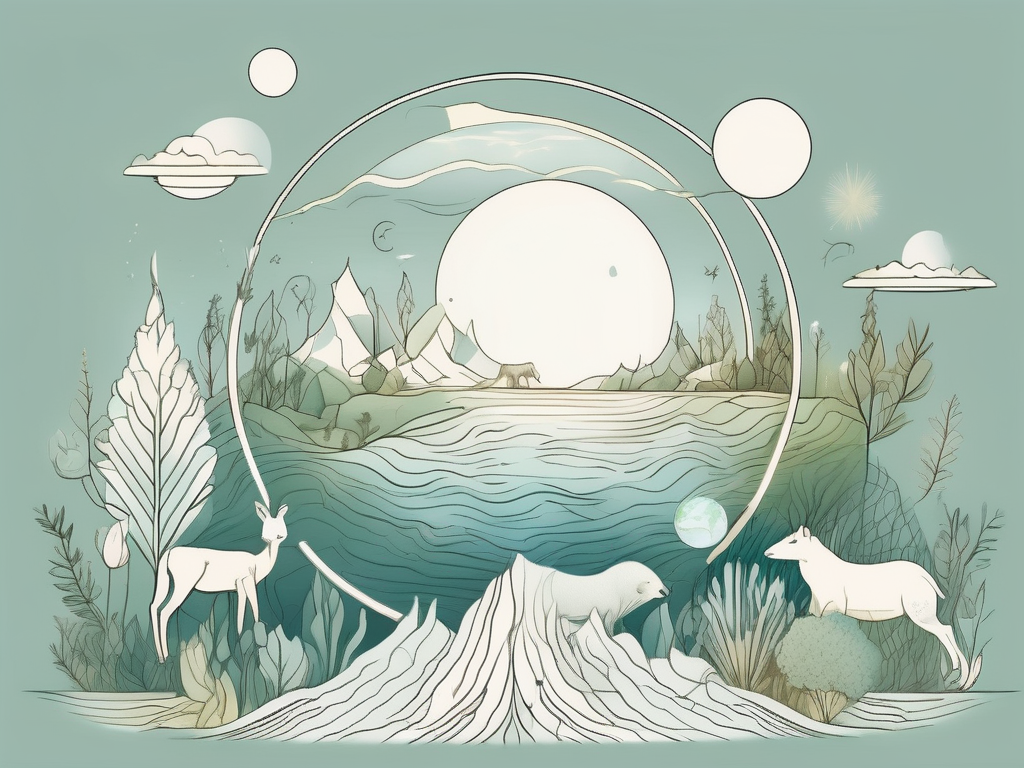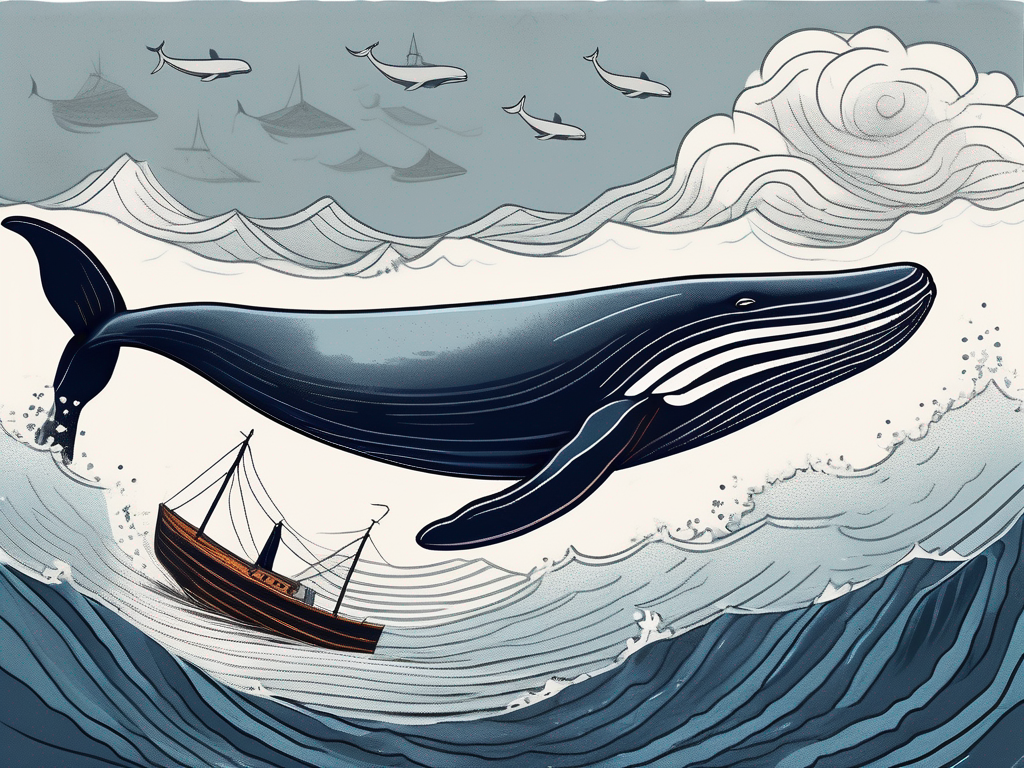Nature has always held a special place in our hearts. Its breathtaking beauty and awe-inspiring wonders never fail to captivate us. But have you ever wondered what the Bible has to say about nature? As it turns out, nature plays a significant role in the biblical narrative, offering insights into God’s creation, His power, and even our responsibilities as stewards of the Earth.
Understanding the Biblical Perspective on Nature
When it comes to nature, the Bible provides us with a multifaceted perspective. First and foremost, we encounter the creation story, which reveals nature’s origin. In these ancient texts, we learn of how God meticulously formed the heavens and the Earth, bringing forth the land, the sea, and all living creatures. Nature, thus, emerges as a masterpiece crafted by the divine hand.
As we delve deeper into the biblical narrative, we discover that nature is not only a product of God’s creative power but also a reflection of His character. The Bible portrays God as a loving and caring Creator who provides for His creation. Just as Jesus taught His disciples, “Look at the birds of the air; they do not sow or reap or store away in barns, and yet your heavenly Father feeds them. Are you not much more valuable than they?” (Matthew 6:26). This profound statement highlights the intimate connection between God and nature, emphasizing His role as a sustainer and provider.
Furthermore, the Bible depicts nature as a manifestation of God’s power. Just as the Psalms declare, “The heavens declare the glory of God; the skies proclaim the work of his hands” (Psalm 19:1). Nature, with all its splendor and intricacy, becomes a testament to the majesty and wisdom of its Creator.
When we observe the wonders of nature, we are invited to contemplate the greatness of God. From the towering mountains to the vast oceans, from the delicate petals of a flower to the intricate ecosystem of a rainforest, every aspect of nature reveals a glimpse of God’s infinite creativity. The intricate design of a snowflake, the harmonious melodies of birdsong, and the vibrant colors of a sunset all point to the beauty and artistry of the Creator.
Moreover, the Bible teaches us to appreciate and care for the natural world. In the book of Genesis, God commands humanity to “fill the earth and subdue it” (Genesis 1:28). This responsibility includes stewardship and wise management of the earth’s resources. As stewards of creation, we are called to protect and preserve the environment, ensuring that future generations can also experience the wonders of God’s handiwork.
In conclusion, the biblical perspective on nature is rich and multifaceted. It reveals nature’s origin as a masterpiece crafted by God’s hand, showcases the intimate connection between God and His creation, and invites us to contemplate the greatness and beauty of the Creator. Furthermore, it calls us to be responsible stewards of the natural world, caring for and preserving the environment for future generations. May we always marvel at the wonders of nature and recognize the divine fingerprints that are imprinted upon it.
Biblical Verses About Nature
In the vast array of biblical verses, we find numerous references to nature. These verses not only highlight its beauty but also draw our attention to the lessons and symbolism it holds.
Nature, in all its magnificence, has always played a significant role in the biblical narrative. From the very beginning, when God created the heavens and the earth, to the final chapters of Revelation, where a new heaven and a new earth are promised, nature is intricately woven into the tapestry of God’s plan for humanity.
Old Testament References to Nature
In the Old Testament, nature often serves as a backdrop for God’s dealings with His people. From the haunting wilderness wanderings to the mighty display of power in the parting of the Red Sea, nature becomes intertwined with the unfolding of biblical history.
It is in this context that we encounter verses such as Psalm 50:10-11, which proclaims, “For every animal of the forest is mine, and the cattle on a thousand hills… for the world is mine, and all that is in it.” These words remind us of God’s ownership and sovereignty over all creation. They invite us to marvel at the intricate ecosystems and diverse species that inhabit the earth, recognizing that they are all part of God’s grand design.
Furthermore, the Old Testament is replete with poetic descriptions of nature’s beauty and power. In the book of Job, for example, we read of God’s wisdom and creativity displayed in the intricate details of His creation. Job 38:4-7 asks, “Where were you when I laid the earth’s foundation? Tell me, if you understand. Who marked off its dimensions? Surely you know! Who stretched a measuring line across it? On what were its footings set, or who laid its cornerstone—while the morning stars sang together and all the angels shouted for joy?” These verses invite us to contemplate the vastness of the universe and our place within it.
New Testament References to Nature
The New Testament offers its own insights into the significance of nature. Jesus, the great teacher, often used parables related to agriculture and natural elements to convey profound spiritual truths. Through these parables, nature becomes a conduit for understanding the kingdom of God.
As Jesus shared in the parable of the sower, seeds sown in different types of soil represent the reception of His message, shedding light on the importance of cultivating a receptive heart to spiritual growth. The parable of the mustard seed highlights the potential for exponential growth in the kingdom of God, drawing a parallel to the way a tiny seed can grow into a large tree.
Moreover, Jesus often retreated to natural settings for prayer and solitude, emphasizing the importance of connecting with God through the beauty and serenity of creation. In the Gospel of Matthew, we read about Jesus going up on a mountainside to pray, away from the distractions of daily life. This serves as a reminder for us to find moments of stillness and awe in nature, where we can encounter God in a profound way.
Throughout the New Testament, we also find references to the role of nature in pointing to God’s power and glory. Romans 1:20 states, “For since the creation of the world God’s invisible qualities—his eternal power and divine nature—have been clearly seen, being understood from what has been made, so that people are without excuse.” This verse underscores the idea that nature itself testifies to the existence and character of God.
In conclusion, the biblical verses about nature not only celebrate its beauty but also invite us to contemplate its deeper meaning. Nature serves as a powerful reminder of God’s sovereignty, creativity, and wisdom. It teaches us valuable lessons about growth, receptivity, and the kingdom of God. As we immerse ourselves in the wonders of nature, may we be inspired to praise the Creator and seek a deeper understanding of His divine plan.
The Role of Nature in Biblical Parables
The biblical parables provide us with vivid imagery and tangible examples that easily resonate with our lives. And nature plays a prominent role in this teaching technique.
When we delve into the teachings of Jesus, we find that He often drew upon natural elements to convey profound spiritual truths. Just as a mustard seed, the smallest of seeds, grows into a large tree, so too can the smallest acts of faith yield great results (Matthew 13:31-32). Through this simple analogy, Jesus invites us to appreciate the transformative power of even the most seemingly insignificant actions.
Imagine a small mustard seed, barely noticeable in the palm of your hand. It seems insignificant, almost inconsequential. Yet, when planted in fertile soil, it sprouts and grows into a towering tree, providing shelter and sustenance for countless creatures. This remarkable process mirrors the potential within each of us. Our faith, no matter how small it may seem, has the power to grow and flourish, impacting not only our own lives but also those around us.
Furthermore, nature holds rich symbolism in the biblical parables. Consider the parable of the prodigal son, where the father’s warm embrace and celebration are symbolized by the fattened calf. This imagery evokes the abundance and joy that awaits those who turn back to God. Just as the prodigal son was welcomed back with open arms, we too can experience the overwhelming love and acceptance of our Heavenly Father.
Picture the scene: a weary traveler, covered in dirt and shame, returning home after a long journey of rebellion and self-discovery. As he approaches his father’s house, he sees a fattened calf being prepared for a grand feast. The aroma of roasted meat fills the air, and the sound of laughter and music drifts from within. This feast symbolizes not only the physical abundance but also the spiritual restoration that comes from reconciling with God. It represents the joyous celebration that occurs when we humble ourselves and turn back to our Creator.
By utilizing elements from nature, Jesus crafts parables that resonate deeply within our hearts and offer profound insights into the kingdom of Heaven. He invites us to observe the world around us and draw lessons from its intricate design and processes. From the gentle lilies of the field to the mighty cedars of Lebanon, nature serves as a constant reminder of God’s presence and His desire to teach us through His creation.
Nature and Human Stewardship in the Bible
The Bible not only speaks of our interaction with nature but also highlights our responsibility as stewards of the Earth. This profound connection between humanity and the natural world is woven throughout the sacred texts, revealing the divine intention for us to be caretakers of the environment.
Biblical Instructions for Caring for the Earth
From the very beginning, God entrusted humanity with the task of caring for His creation. In Genesis 2:15, we read, “The Lord God took the man and put him in the Garden of Eden to work it and take care of it.” This instruction reflects the divine desire for humanity to actively engage with and protect the environment. It is a call to be responsible caretakers of the Earth, ensuring its preservation for future generations.
As stewards of the Earth, we are called to cultivate and nurture the land, recognizing the interconnectedness between our actions and the well-being of the natural world. This responsibility extends beyond mere exploitation for our own gain, but rather, it encompasses a holistic approach that considers the long-term sustainability of the Earth’s resources.
Moreover, biblical teachings emphasize the importance of living in harmony with nature. The book of Leviticus, for example, outlines various laws that promote environmental stewardship. These laws include regulations on agricultural practices, such as leaving the corners of fields unharvested for the poor and not overworking the land, allowing it to rest during the Sabbath year. These instructions demonstrate the divine wisdom in balancing human needs with the preservation of the Earth’s ecosystems.
Consequences of Neglecting Nature in the Bible
The consequences of neglecting nature are also evident in biblical accounts. Time and again, we witness how the disregard for God’s creation leads to calamity and suffering. For instance, the book of Exodus recounts the devastating plagues that befell Egypt due to Pharaoh’s refusal to release the Israelites. This narrative serves as a stark reminder of the repercussions that come from disrespecting the natural order established by God.
Furthermore, the book of Jeremiah warns of the dire consequences of forsaking God’s commandments, which include the mistreatment of the land. In Jeremiah 12:4, it is written, “How long will the land lie parched and the grass in every field be withered? Because those who live in it are wicked, the animals and birds have perished.” This passage highlights the interconnectedness between human actions and the well-being of the natural world. It serves as a cautionary tale, urging us to recognize the importance of our role as stewards and to act in accordance with God’s divine plan for creation.
Throughout the Bible, we are reminded of the intricate relationship between humanity and nature. Our actions have far-reaching consequences, not only for ourselves but for the entire ecosystem. As stewards of the Earth, we are called to embrace our responsibility and actively engage in preserving and protecting God’s creation for present and future generations.
Theological Interpretations of Nature in the Bible
When we delve deeper into the biblical perspective on nature, we discover profound theological interpretations.
Nature as a Reflection of God’s Character
Throughout the Bible, nature is often presented as a reflection of God’s character. Just as nature demonstrates diversity, beauty, and intricacy, these attributes also find their embodiment in God Himself. A passage in Isaiah eloquently captures this notion, proclaiming, “To whom will you compare me? Or who is my equal? says the Holy One.” (Isaiah 40:25). Thus, as we marvel at the wonders of nature, we catch a glimpse of the greatness and magnificence of our Creator.
Nature and the Divine Plan
The Bible also portrays nature as an integral part of God’s divine plan for humanity. It reveals how creation, redemption, and restoration intertwine to bring about the reconciliation between God and humankind. Nature, as an essential component of this plan, plays a significant role in reflecting God’s glory and pointing us towards His ultimate purposes.
In conclusion, the Bible portrays nature as more than just a picturesque backdrop. It reveals profound insights into the origin, power, and purpose of nature. It reminds us of our role as stewards of the Earth and highlights the consequences of neglecting our responsibilities. Above all, it invites us to contemplate the theological significance of nature, offering glimpses into the greatness and character of our Creator. So, the next time you find solace in the beauty of a sunrise or marvel at the intricate patterns of a flower, remember that nature is but a reflection of God’s wisdom and love.












